With the blueberry demand rising year-round and supply still struggling to keep pace, breeding company Fall Creek sees a window for growth like never before. Strategic harvest timing in South Africa, Zimbabwe, and Namibia could help close the annual supply gap, while new high-performing varieties promise longer shelf life and consistent quality.
This was discussed today as Fall Creek hosted their Connect Event at its nursery in Paarl, ahead of the 2025 International Blueberry Organization (IBO) Summit in Cape Town. They welcomed growers, partners, and industry leaders from around the world to discuss how the global blueberry market is on the brink of a major shift, and Southern Africa is poised to play a starring role.
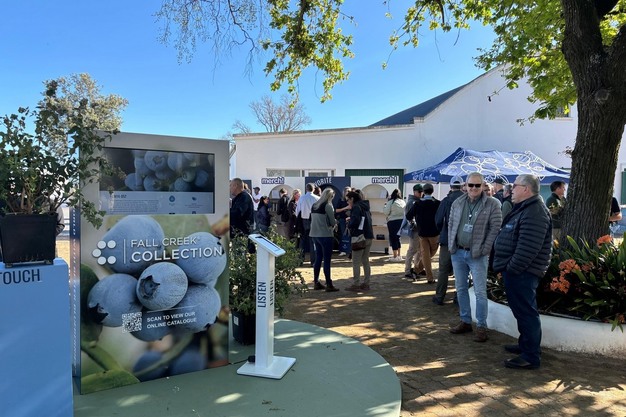 © HortiDaily
© HortiDaily
Ameli Aust, Past Board Chair of Fall Creek, shares the company's journey from its early breeding trials in Mexico to becoming a global player with operations across five continents. She recounts the impact of the 2008 financial crisis. "Our revenue dropped to levels below where we had been two years before. We had to diversify, and at one point we even grew stevia and hazelnuts," she says.
She describes Fall Creek's long-term vision: producing blueberries 52 weeks a year. "We diversified from high chill, to lower chill, to zero chill, with Peru and Mexico leading the way. Chile and South Africa followed, and China was the last on our list," she explains.
She adds, "South Africa is at an inflection point right now. There's great potential, and the fact that the IBO Summit is happening here this year speaks volumes."
With Fall Creek approaching its 50th anniversary, she notes that the company is strengthening its leadership team and governance. "We're still a family business, but the family is now even more involved in the strategy," she says.
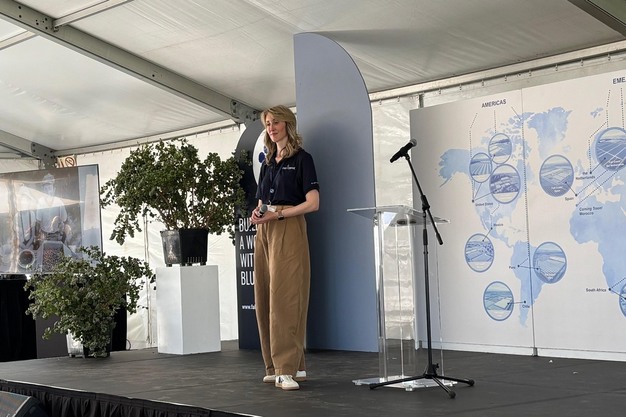 © HortiDaily
© HortiDaily
Ameli Aust, Past Board Chair at Fall Creek
Innovation and investment locally
Herman Louw, Country Manager for Fall Creek South Africa, introduces the nursery in Paarl as a hub of innovation and scale. "We're growing blueberries in places they've never been grown before, and that's no easy task," he says. "It's a tough business, and we want to be part of that learning and growth process with the growers."
He expresses pride in the local team and Fall Creek's broader support. "This facility has the capacity to double in size. We're inviting growers to connect with us and see the potential for investment and partnership."
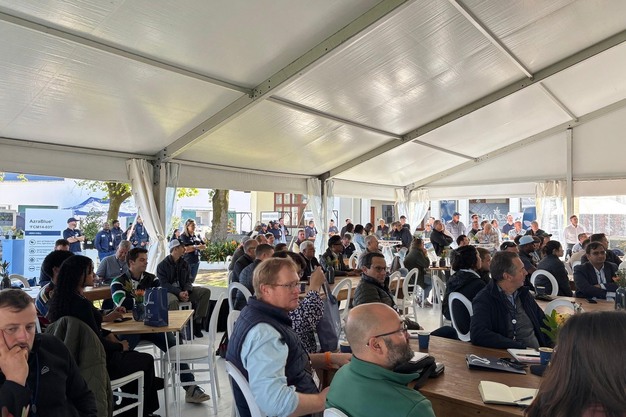 © HortiDaily
© HortiDaily
Market realities: "Quality must be consistent"
Cindy van Rijswijk of Rabobank (Netherlands) shared a detailed market overview, pointing out that while demand for blueberries continues to grow, maintaining quality and efficiency is critical. "Blueberries are outperforming other fruits in the EU," she notes, referencing price and volume data. "But if markets are flooded with inconsistent quality, prices will fall."
She explains that while the purchasing power in Europe has improved recently, consumers remain cautious. "People are saving more and still experience sticker shock when comparing prices to two or three years ago," she says.
She also highlights that blueberries are no longer seen as just a seasonal fruit. "We see more year-round buying patterns. This opens up new windows, especially for growers in Southern Africa."
 © HortiDaily
© HortiDaily
Barbara Botes, Southern Africa Area Manager of Fall Creek thanking Cindy van Rijswijk of Rabobank for her insights
Lessons from Peru: Growth and climate challenges
Julio Zavala Muñoz, General Manager of Fall Creek Peru, offers insights into Peru's rapid industry growth. "In 2017, Peru produced 27,000 tons. We expect 400,000 tons in 2025," he says. "El Niño last year cut our peak week from 21,000 tons to 11,000, but we are positive that this year will be normal again. Climate unpredictability is a real challenge."
He explains that the Peruvian industry is evolving from soil to substrates, investing in fertigation and irrigation systems. "It's not just about production anymore, it's about precision," he says.
He also notes logistical and political difficulties. "Last year, table grapes got priority over blueberries in shipping for a few days. And while the politics can be unstable, as a private company we've found ways to continue growing."
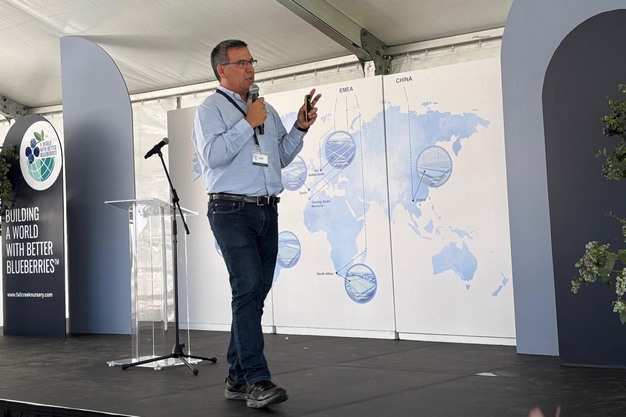 © HortiDaily
© HortiDaily
Julio Zavala Muñoz, General Manager of Fall Creek Peru
Breeding for the future
Jesus Morales Huerta, Senior Applied Research Manager at Fall Creek Mexico, outlines the company's rigorous breeding process. "It takes 8 to 15 years to develop a commercial variety," he says. "We test in more than 140 trial areas before releasing a variety to ensure it works across different regions."
Fall Creek's breeding programs now span high, low, and zero chill environments to cater for diverse regions and supply. "It's not enough for a berry to taste good. It needs to have consistent shelf life, be harvestable by machines, and meet grower economics."
He announces two promising new varieties: FCE21-017, an early-season jumbo-sized variety with a 45-day shelf life, and FCE21-024, a mid-late season berry with 120-day shelf life. "FCE21-017 could be a strong option for South Africa, peaking around April/May," he adds. The varietal names will be released soon.
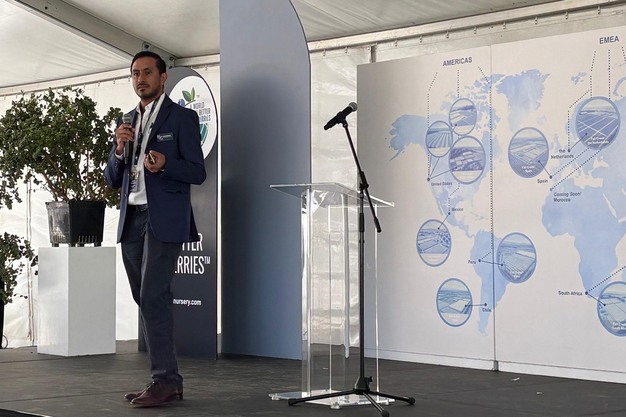 © HortiDaily
© HortiDaily
Jesus Morales Huerta, Senior Applied Research Manager at Fall Creek Mexico
SEKOYA and strategic supply planning
Mark David, Vice President and General Manager of SEKOYA, presents the company's vision of year-round premium supply. "Our mission is to supply quality fruit 52 weeks a year, coordinated globally with growers," he says.
David notes that 80 million SEKOYA plants are already in the ground, with 45% of them being in Peru. For Southern Africa, weeks 20 to 38 offer the most strategic supply opportunity. "This region has one of the biggest windows for growth. We are also very excited to see what Morocco brings to the table," he adds.
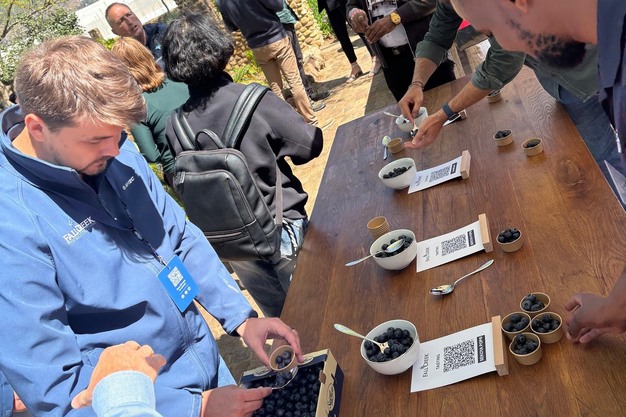 © HortiDaily
© HortiDaily
"Southern Africa as the future alternative source of supply"
Paul Nselel, Chief Commercial Officer at Fall Creek, explains the company's investment in the region. "Southern Africa has a long agricultural history and affordable labour. If growers manage input costs well, they have a unique global competitive advantage," he says.
He highlights how the potential harvest timing across Zimbabwe (April), Namibia (May), and South Africa (June) aligns perfectly with global demand.
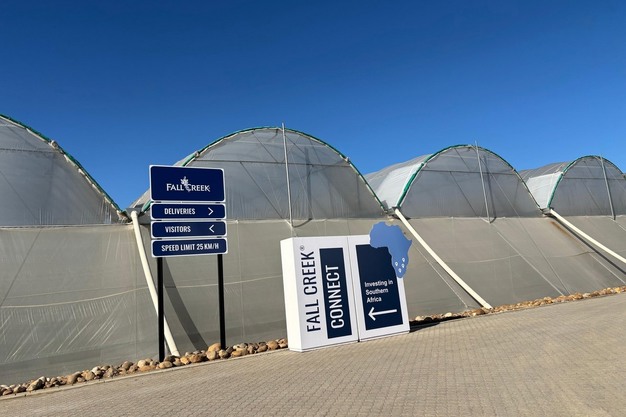 © HortiDaily
© HortiDaily
Cort Brazelton, CEO of Fall Creek and a contributor to the 17th IBO Global State of the Blueberry Industry Report, highlights the scale of opportunity ahead. "If we do everything right, global blueberry production could reach 2.4 million metric tons by 2030; that's 2.4 billion kilos," he says.
However, he points out a significant gap in supply across the year. "When you divide the calendar into three equal production windows, we're still short by 800,000 metric tons in each of those periods," he explains. "Southern Africa is uniquely positioned to help fill that gap, especially during the peak demand window."
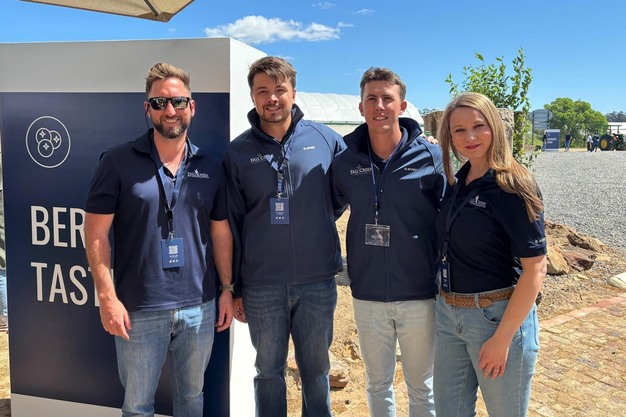 © HortiDaily
© HortiDaily
Stegmann Hanekom, Mark Pretorius, Anthony Bingley, Melise Ferreira; Grower Support and Customer Service in South Africa
He emphasises that success depends on quality. "The opportunity is massive, but we need consistent, premium fruit. That's why Fall Creek started in South Africa in the first place. It's not about competing with other growers or breeding programs anymore: the opportunity is simply that big."
 For more information:
For more information:
Fall Creek Farm & Nursery, Inc.
Stephanie van Rensburg
[email protected]
www.fallcreeknursery.com
